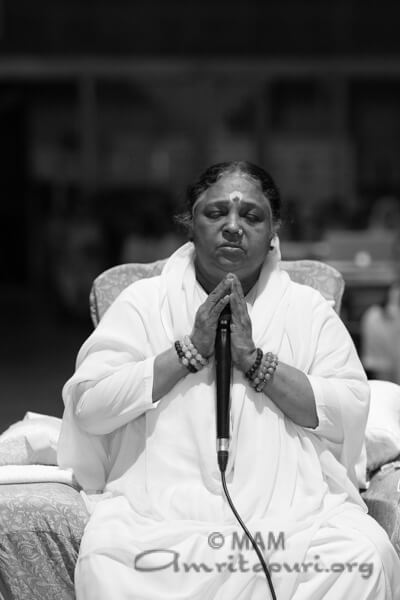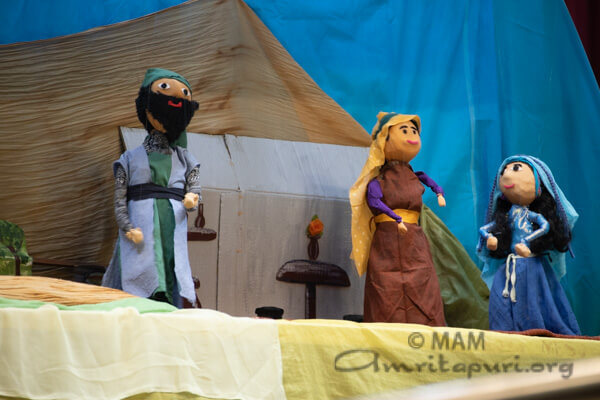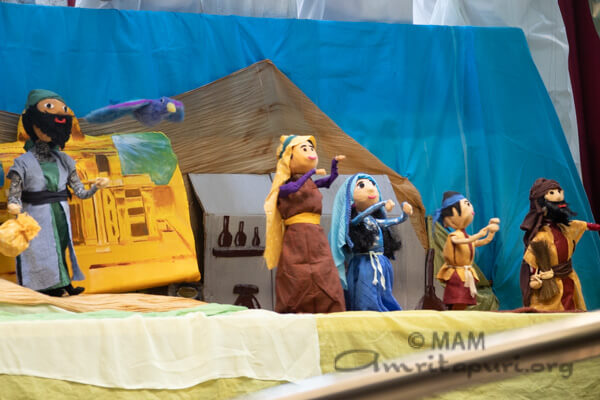25 December 2020 — Amritapuri
Excerpts from Amma’s message on Christmas.
Amma bows to all of you, who are embodiments of divine love and supreme consciousness.
Christmas has arrived again, bearing the tidings of love, compassion, sacrifice and goodwill. Holidays such as Christmas are the wake-up songs of the entire human race. Whether it is Christmas, other festivals or any ordinary day, all throughout the year both God and Nature are sending us the same message—the message of jāgrata [alertness]. In fact, alertness is a quality that must always be present in our life. Lately, not only have we failed to be alert, we have acted as if we have forgotten this value altogether. Perhaps it was due to the depth of our forgetfulness that Mother Nature decided to jog our memory with this extreme situation.

Actually, this situation is neither extreme nor cruel. When a child makes a mistake, doesn’t his mother scold him? The child has yet to develop proper awareness. He lacks discrimination to understand right from wrong. So, he can only be stopped from repeating his mistake through fear. When a child realizes there’s a chance of getting punished, he will stop his bad action. If a goat or a cow or a rabbit or a deer starts eating the vegetables planted in your yard, what will you do? The animal doesn’t know the difference between a vegetable garden and a patch of wild plants. It doesn’t understand what to do and what not to do. So, what do we do when one gets into our yard? We pick up a stick and threaten it, shouting, “Shoo! Get out of here, cow! Get out of here, rabbit!” We adopt a threatening attitude, and we act like we are about to strike it, but inside we don’t have anger. Similarly, this situation is a beating given to us by Nature to make us more alert.
This year many of us are unable to go out and enjoy the Christmas decorations, festivities and shopping as usual. We are forced to abide by many rules, regulations and protocols. In fact, this is not a time to go out; it’s an opportunity to look within. We have to use our God-given external freedom with proper discernment and self-restraint. God may have decided that if we have time to look within, we will be able to use that time to understand and correct our mistakes.
Sanātana Dharma teaches the principle of looking within. The principle of uttiṣṭha jāgrata—“Arise! Awake!” For only those who do so will achieve the goal of Self-realization. uttiṣṭha jāgrata prāpya varān nibodhata | [Kaṭha Upaniṣad, 1.3.14] “Rise up! Wake up! Having approached the great ones, understand [their teachings].”
It is not just “wake up,” we are urged to wake up and get up. We are told to wake up to our own True Self, and to arise and use the strength and potential within us. It means to become strong and self-reliant.
Christ said “Seek, and you will find.” Here the seeking has to be inside and not in the external world. But currently the seeking of many is limited to “Where can I find this latest style of necklace?” Whether it is Christmas or any other festival, our focus is always outward. “Can I buy this here?” “Is this style of dress available in that boutique?” “Can I get that necklace at this jewelry store?” “How much does that cost?” This is the sole nature of our search. We seek to buy new clothes for Christmas, send nice cards, and so on. Our seeking is all external. The seeking Christ talked about was not like this; it was internal seeking. But we are all hurriedly chasing the nonessential—searching for and finding everything but what we should actually be looking for.
God has given us eyes not just to view the external world and remain deluded by it. It is also so that we close them and look within, finally seeing with our inner eye that the inside and outside are actually one. The two external eyes are only needed to see the outside world. To see the inner world, and to know the True Self, external eyes are not needed. Because the real “I” is within, not outside.
We are not separate islands; we are all connected to each other like links on a chain. Compassion, love and goodwill should fill us to the brim and overflow outside. Christ was asked by his disciples, “What is the kingdom of heaven like?” And he replied, “Like a grain of mustard seed.” For a seed to become a tree, its shell has to break. Once it grows, it becomes a haven for birds, animals and man alike. Christ’s words indicated that we have to grow and become like that. Just as the seed grows to become a tree, God is present as the jīva [individual consciousness] within each of us. If a hundred pots of water are kept in the sun, the sun’s reflection can be seen on each surface, but the real sun is only one. Similarly, it is the one True Self present within each individual. However, the manifestation of the Self in each individual will vary. If the glass cover of a lamp is coated with soot, the entire light is not revealed. Similarly, as long as selfishness and ego reside in us, we cannot express or experience the divinity within us.
Festivals such as Christmas are usually celebrated with revelry, full of fun and joy—as they should be. But when you descend from revelry, you should be able to reflect on your life and evaluate yourself. What did I do for society? Did I take just for myself? Or was I able to do something for Mother Nature?

“Love your neighbour as yourself,” says Christ. Every person we meet in the flow of life—every person we get to know, every person who comes beside us—are our neighbours. If we can see them as ourselves and love them, then that itself is the highway to achieving completeness. Śrī Kṛṣṇa, Śrī Rāma and Christ all live within our heart. Christmas reminds us of the need to bring that self-sacrifice, compassion, humility and firm faith in God into our lives. May that awakening arise in everyone. Let us decorate the manger of our heart with good thoughts, sweet words and compassionate acts, for the heart, is God’s real dwelling place. Let us open our heart. When we do so, we will find safety and security is there within ourselves. Amma’s Christmas wishes to all her children. May grace bless all my children.

